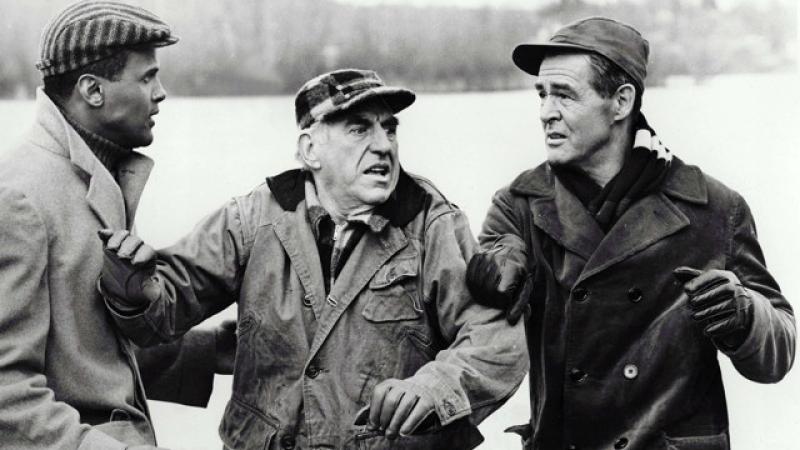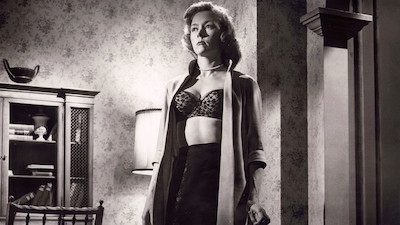DVD/Blu-ray: Odds Against Tomorrow | reviews, news & interviews
DVD/Blu-ray: Odds Against Tomorrow
DVD/Blu-ray: Odds Against Tomorrow
How Harry Belafonte and Robert Ryan teamed for a timely anti-racist film noir

Robert Wise directed the 1959 bank heist thriller Odds Against Tomorrow after the classic film noir cycle had ended, but it's an exemplary noir nonetheless. In its day it was an important transitional work – a race-relations allegory, less well-known or hopeful than Stanley Kramer's 1958 The Defiant Ones, that played its part in the burgeoning Civil Rights movement.
Harry Belafonte initiated the project for his production company and hired the blacklisted screenwriter Abraham Polonsky to adapt the novel by William P. McGivern (author, too, of The Big Heat). The loot deperately sought by the Mob debtor Johnny Ingram (Belafonte), the volatile Oklahoman ex-con Earl Slater (Robert Ryan), and Dave Burke (Ed Begley), the disgraced former cop who masterminds the heist, is a MacGuffin for Polonsky's bleak analysis of the untenability of racism in a functioning society.
 The trio travels from Manhattan to an upstate New York town with a vulnerable bank. Their mission is jeopardised by Earl and Johnny's mutual hatred. Ryan is typically riveting as a gnarled loser whose loathing is really self-directed; Earl is a more complex character, though, than Ryan's anti-semitic psycho in Crossfire (1947).
The trio travels from Manhattan to an upstate New York town with a vulnerable bank. Their mission is jeopardised by Earl and Johnny's mutual hatred. Ryan is typically riveting as a gnarled loser whose loathing is really self-directed; Earl is a more complex character, though, than Ryan's anti-semitic psycho in Crossfire (1947).
Ryan himself was a liberal Democrat, pacifist, and ardent Civil Rights campaigner. In an especially enlightening 2009 interview with the film scholar Foster Hirsch, which is included in the BFI's dual-format disc, Belafonte recalls introducing his great co-star to Martin Luther King, Jr.
Wise grounds the film in Johnny and Earl's daily lives. Johnny is a jazz singer unfaithful to his wife (Kim Hamilton), who is integrating into white society for the sake of their child. Earl is a loser dependent on his hardworking girlfriend (Shelley Winters). Sent by her to pick up her dry cleaning – a rare case of a domestic chore obtruding into a film noir – he has a violent altercation with a cocky young soldier in a bar. He also defiantly screws a bored housewife after she gets him to tell her how he felt when he killed a man; in three short scenes, Gloria Grahame (pictured above) made this slummocky vampire unforgettable, as only she could.
Joseph Brun's beautiful location cinematography, memorable for its abbreviated tracking shots, adds a documentary flavour to a movie otherwise characterised by night-for-night external sequences and interiors stencilled by venetian-blind shadows. John Lewis's jazz score, ironically louche, intensifies the fatalistic mood. The other extras include a video commentary by Film London's Adrian Wootton and NFT interviews with Ryan (audio only) from 1969 and Wise from 1995.
rating
Share this article
The future of Arts Journalism
You can stop theartsdesk.com closing!
We urgently need financing to survive. Our fundraising drive has thus far raised £49,000 but we need to reach £100,000 or we will be forced to close. Please contribute here: https://gofund.me/c3f6033d
And if you can forward this information to anyone who might assist, we’d be grateful.

Subscribe to theartsdesk.com
Thank you for continuing to read our work on theartsdesk.com. For unlimited access to every article in its entirety, including our archive of more than 15,000 pieces, we're asking for £5 per month or £40 per year. We feel it's a very good deal, and hope you do too.
To take a subscription now simply click here.
And if you're looking for that extra gift for a friend or family member, why not treat them to a theartsdesk.com gift subscription?
more Film
 Oslo Stories Trilogy: Sex review - sexual identity slips, hurts and heals
A quietly visionary series concludes with two chimney sweeps' awkward sexual liberation
Oslo Stories Trilogy: Sex review - sexual identity slips, hurts and heals
A quietly visionary series concludes with two chimney sweeps' awkward sexual liberation
 Sorry, Baby review - the healing power of friendship in the aftermath of sexual assault
Eva Victor writes, directs and stars in their endearing debut feature
Sorry, Baby review - the healing power of friendship in the aftermath of sexual assault
Eva Victor writes, directs and stars in their endearing debut feature
 Blu-ray: Who Wants to Kill Jessie?
Fast-paced and visually inventive Czech comedy
Blu-ray: Who Wants to Kill Jessie?
Fast-paced and visually inventive Czech comedy
 Oslo Stories Trilogy: Love review - freed love
Gay cruising offers straight female lessons in a heady ode to urban connection
Oslo Stories Trilogy: Love review - freed love
Gay cruising offers straight female lessons in a heady ode to urban connection
 Beating Hearts review - kiss kiss, slam slam
Romance and clobberings in a so-so French melodrama
Beating Hearts review - kiss kiss, slam slam
Romance and clobberings in a so-so French melodrama
 Materialists review - a misfiring romcom or an undercooked satire?
Writer-director Celine Song's latest can't decide what kind of film it is
Materialists review - a misfiring romcom or an undercooked satire?
Writer-director Celine Song's latest can't decide what kind of film it is
 theartsdesk Q&A: actor Leonie Benesch on playing an overburdened nurse in the Swiss drama 'Late Shift'
The Guildhall-trained German star talks about the enormous pressures placed on nurses and her admiration for British films and TV
theartsdesk Q&A: actor Leonie Benesch on playing an overburdened nurse in the Swiss drama 'Late Shift'
The Guildhall-trained German star talks about the enormous pressures placed on nurses and her admiration for British films and TV
 Freakier Friday review - body-swapping gone ballistic
Lindsay Lohan and Jamie Lee Curtis's comedy sequel jumbles up more than their daughter-mother duo
Freakier Friday review - body-swapping gone ballistic
Lindsay Lohan and Jamie Lee Curtis's comedy sequel jumbles up more than their daughter-mother duo
 Eight Postcards from Utopia review - ads from the era when 1990s Romania embraced capitalism
Radu Jude's documentary is a mad montage of cheesy TV commercials
Eight Postcards from Utopia review - ads from the era when 1990s Romania embraced capitalism
Radu Jude's documentary is a mad montage of cheesy TV commercials
 The Kingdom review - coming of age as the body count rises
A teen belatedly bonds with her mysterious dad in an unflinching Corsican mob drama
The Kingdom review - coming of age as the body count rises
A teen belatedly bonds with her mysterious dad in an unflinching Corsican mob drama
 Weapons review - suffer the children
'Barbarian' follow-up hiply riffs on ancient fears
Weapons review - suffer the children
'Barbarian' follow-up hiply riffs on ancient fears

Add comment